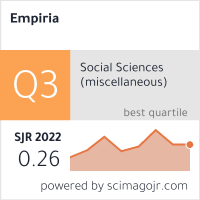Responsible investigation in the audience and reception studies
DOI:
https://doi.org/10.5944/empiria.42.2019.23251Keywords:
responsible research, audience, ethics, RRIAbstract
Responsible research includes, beyond ethics in the content and process, engagement of multiple actors and the public, access to scientific results, gender perspective, and scientific education. The RRI (Responsible Research and Innovation) movement aims to create a society where research and innovation practices are oriented towards achieving sustainable, ethically acceptable and socially desirable results related to the values, needs and expectations of society. Research in communication, and specifically in audiences and reception, does not escape this trend. In this new conception, a step forward with respect to ethics is taken and the responsibility is attributed not only to the researcher but also to the concept of co-responsibility. In short, with the initial impulse of the European Commission, an inclusive and sustainable research is advocated. This article intends, on the one hand, to present a brief review of the evolution and actuality of audience and reception studies from the perspective of the epistemological ruptures experienced and the different challenges it faces (conceptual, methodological and ethical) and, on the other hand, to understand the origin, evolution and trends of the concept of RRI and, finally, to see how it can be applied to the study of the audience and reception. The article has the vocation to become a text that can help researchers in this field to reflect on how to incorporate the RRI into their work.
Downloads
Downloads
Published
How to Cite
Issue
Section
License
Los autores que publican en esta revista están de acuerdo con los siguientes términos:a) Los autores conservan los derechos de autor y garantizan a la revista el derecho de ser la primera publicación del trabajo al igual que licenciado bajo una Licencia Internacional Creative Commons CC BY-NC-SA 4.0.
b) Se permite y se anima a los autores a difundir electrónicamente las versiones pre-print (versión antes de ser evaluada) y/o post-print (versión evaluada y aceptada para su publicación) de sus obras antes de su publicación, ya que favorece su circulación y difusión más temprana y con ello un posible aumento en su citación y alcance entre la comunidad académica.










